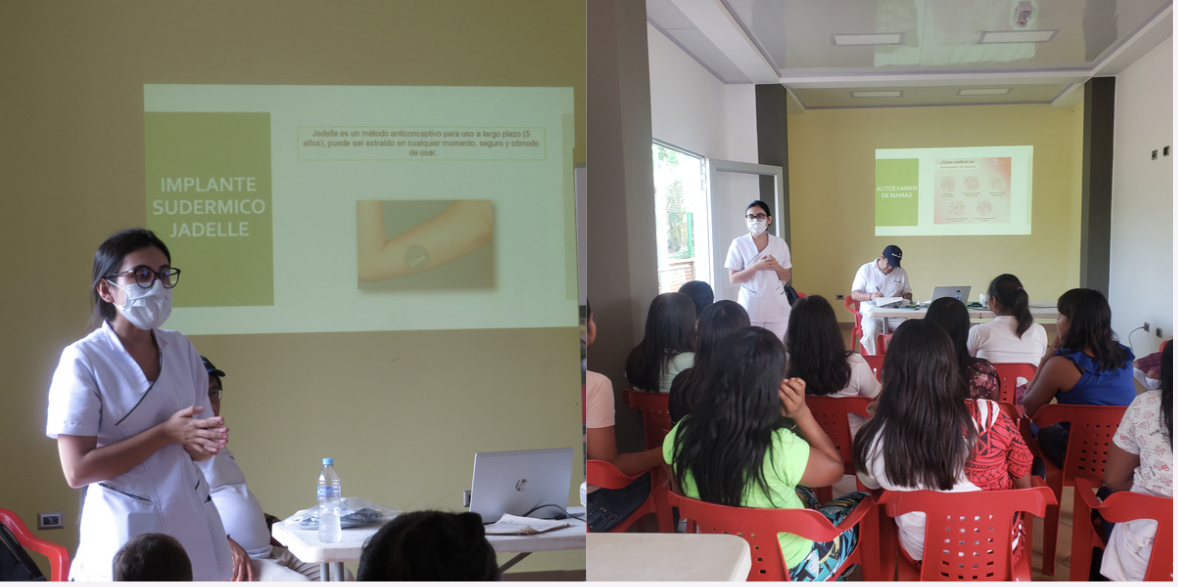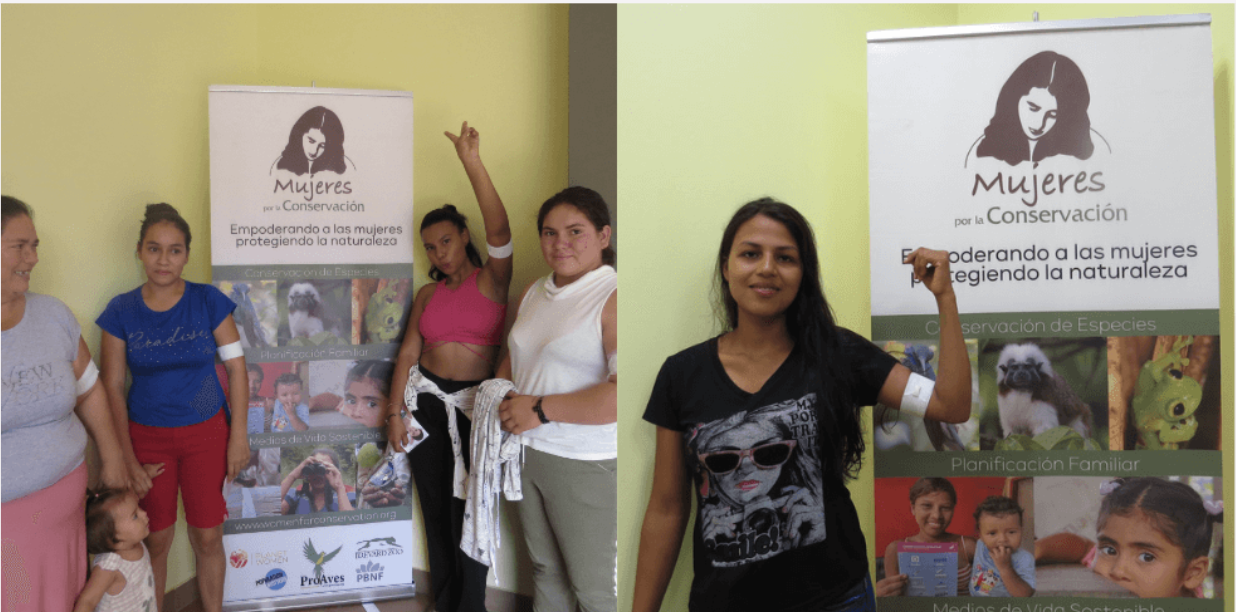Guest article by Maria José Diniz da Costa, PhD
Maria José Minhoto Diniz da Costa, PhD is a reproductive biologist dedicated to women’s health research. After completing her PhD at Warwick University in Recurrent Pregnancy Loss, Maria worked as a Postdoctoral Associate at Duke University in Fetal-Maternal medicine research. Maria’s passion for community health led her back to grad school where she is currently completing her second Master’s focused on Public Health.

Mapiripán, Colombia, April 2023– Photos from Women for Conservation’s Family Planning Day providing women free access to the Jadelle implant with our partner ProFamilia.
In our last article, we delved into the importance of family planning and explored various available contraceptive methods. In addition to empowering women to make choices about their reproductive and sexual lives, family planning also saves lives by preventing unsafe abortions and spacing out pregnancies, which directly improves infant survival rates. The advantages and benefits of comprehensive family planning strategies within communities extends even further– positively impacting economic empowerment and nature conservation.
Over the past two decades, non-governmental organizations have integrated family planning and reproductive health access into their activities to broaden the scope of their impact and promote the well-being of local communities. But how does this connection work? How do family planning, economic empowerment, and nature conservation relate to one another?
Family Planning Benefits Economic Empowerment
The world’s population is increasing at a rate of 70 million people per year and is projected to reach 10 billion people by 2057 (1). This rate of growth is unsustainable and has a direct impact on the well-being of communities and the economic development of each country. Improvements in reproductive healthcare and access to family planning can positively impact the economy by enhancing overall health and encouraging planned pregnancies. When parents have fewer children, they can allocate more resources and time to each child’s well-being such as their health, nutrition, and education.
Investing in the early stages of a child’s life, particularly in terms of health and nutrition, can yield substantial benefits, such as improved physical and cognitive development, better educational outcomes, and increased income prospects in adulthood (2). In addition to the effects on children’s well-being, access to voluntary family planning directly affects women’s overall well-being. With greater control over the number and timing of pregnancies, women can prevent unwanted pregnancies, pursue higher levels of education, pursue better work opportunities, and ultimately earn more throughout their lifetime (3).
From another perspective, family planning programs may also have important indirect “incentive effects” on girls who are not yet at risk of pregnancy. For example, increased access to modern contraceptives may lead parents to raise their daughters with a future-minded mentality that is focused on their education and work opportunities and invests more in their economic welfare, health, and longevity (2).

Family Planning Benefits Nature Conservation
Apart from increased education rates and reduced poverty rates, another benefit of family planning that has recently been harnessed by governments and NGOs is the connection between family planning and nature conservation. Most key biodiversity hotspots are located in rural areas in low- and middle-income countries, where women face far more barriers to accessing family planning programs, and local communities often face barriers to accessing health services in general, especially for tropical illness or specific health concerns.
Nowadays, we know that an integrated population, health, and environment (PHE) approach in the conservation field is linked to positive impacts on several reproductive health and food security indicators, as well as on natural resource management indicators. It has been shown that partnerships between family planning and organizations focused on natural resource management can lead to better community relations and community involvement and an increase in family planning awareness and acceptance, especially when compared to projects that focus on a single sector (4).
Data from nature conservation projects suggest that integrated family planning programming contributes to improved health for mothers and children, as well as increased participation of women in various activities, including spending more time promoting family planning, health and environmental awareness, and patrolling nature conservation hotspots. Additionally, evidence shows that health interventions generate mutual connection and participation among local communities to engage in conservation efforts in their communities.
In conclusion, family planning interventions play a pivotal role in enhancing both nature conservation and economic empowerment. By empowering individuals to make informed choices about their reproductive health, we not only promote sustainable population growth but also foster economic development, improved health outcomes, and a brighter future for generations to come.
Article by Maria José Diniz da Costa, PhD
Did you know? Women for Conservation is a holistic organization focused on conserving wildlife and their habitats, while partnering with rural women to provide family planning and increased economic opportunities in their communities. In partnership with ProFamilia, a Colombian reproductive healthcare organization, Women for Conservation has provided women and men in our partner communities with a total of 790 implants, 57 tubal ligations, and 46 vasectomies since we were founded in 2019. Through your donations, we can continue to lift up communities near key biodiversity hotspots, ensuring the well-being of rural communities and surrounding habitat.
References:
- Worldometer. (n.d.) Current world population. Retrieved November 7, 202 from https://www.worldometers.info/world-population/#:~:text=Population%20in%20the%20world%20is,it%20was%20at%20around%202%25.
- Canning D, Schultz TP. The economic consequences of reproductive health and family planning. Lancet [Internet]. 2012 Jul 14;380(9837):165–71.
- Miller G. Contraception as Development? New Evidence from Family Planning in Colombia. Econ J. 2010;(120):709–36.
- Honzak BC, Oglethorpe J. Conservation and Family Planning : What is the value of integrating family planning into conservation projects ? 2011;(1):1–5.

